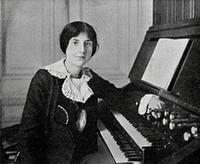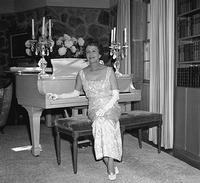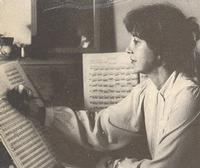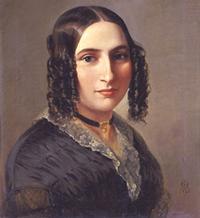by Kile Smith
The National Museum of Women in the Arts asked, "Can you name five women artists?" March is Women’s History Month, and Fleisher Discoveries is answering that question with five women composers – not just historical, but current as well. Lili Boulanger, Elinor Remick Warren, Joelle Wallach, Gloria Coates, and Fanny Mendelssohn. Our plus one? The eminent American conductor JoAnn Falletta, who conducts two of the works included in our podcast. Those two works are performed by the (sadly) now-defunct Women's Philharmonic, so perhaps we should sharpen our pencil and recalculate. In any case, on to our five composers.

Lili was a child prodigy, having perfect pitch from age two, singing and playing many instruments. She studied with Gabriel Fauré, studied organ with Louis Vierne, and left us with these beautiful, extremely skillful works. The Fleisher Collection has produced new critical editions of two works, D'un soir triste, "On a sad evening," and D’un matin de printemps. JoAnn Falletta conducts the Women’s Philharmonic for our featured track.

The Fleisher Collection houses many Elinor Remick Warren works, including The Crystal Lake from 1946, for a time her most-played work. Very simply, the story behind the piece is a hike in the High Sierras with her husband and oldest son. They came upon Crystal Lake, and she was overwhelmed. She couldn’t put the feeling into words, she said, so she composed The Crystal Lake. Ronald Corp conducts the Royal Scottish National Orchestra for the performance we will hear of The Crystal Lake by Elinor Remick Warren, a beautiful scene after a long hike in the mountains.

She wrote her cello and orchestra work, Shadows, Sighs and Songs of Longing at Yaddo, the artists’ colony in Saratoga Springs, New York, and it is very much of that place. The Trasks bought the place as a summer retreat, Wallach explains, but Kristina Trask lost, one by one, each of her children and her husband. Joelle Wallach composed this in Kristina’s room in the winter of 1991, and imagined Kristina’s thoughts throughout the entire composing process of this 16-minute, four-movement work. In our podcast, Robert DeMaine is the cello soloist and Joel Suben conducts the National Slovak Radio Orchestra in Shadows, Sighs and Songs of Longing by Joelle Wallach .

Gloria Coates composed her Seventh Symphony in 1990, a year after the Berlin Wall came down, and it is dedicated "to those who brought down The Wall in Peace." We will hear the second movement, "Glass of Time." Olaf Henzold conducts the Bavarian Radio Symphony Orchestra in the middle movement, "Glass of Time," from the Symphony No. 7 of Gloria Coates.

She was not really discouraged from composing, but not really encouraged, either, in a time when it was not seen as something a woman should aspire to do. Within her musical family, however, her composing was more tolerated than anything, even though her music, whenever it was heard, was admired. Still, in her 42 years she composed more than 400 works.
Fanny unwillingly conducted the premiere of the Overture with musician friends at a house party when the concertmaster handed her a baton. JoAnn Falletta is again featured in our podcast, as she conducts the Women’s Philharmonic in the Ouverture of Fanny Mendelssohn.
Longtime listeners of Discoveries from the Fleisher Collection on the radio and now in our podcasts know that women composers make up a valued part of our broadcast repertoire throughout our history—in fact, we opened up our podcast chapter of Fleisher Discoveries with a Florence Price symphony—but we thought we’d put an exclamation point to this Women’s History Month. Lili Boulanger, Elinor Remick Warren, Joelle Wallach, Gloria Coates, and Fanny Mendelssohn, that’s a pretty good lineup!
Have a question for Free Library staff? Please submit it to our Ask a Librarian page and receive a response within two business days.


